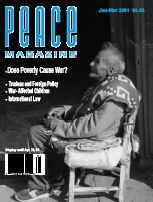
Peace Magazine Jan-Mar 2001, page 15. Some rights reserved.
Search for other articles by Hanna Newcombe here
The empirical link between peace and democracy has been quite firmly established by correlational studies in a rather extensive peace research literature. It states that democratic states (defined below) never or hardly ever fight wars with each other, although they fight just as many wars as non-democratic states with non-democratic states. Note that it is only in mutual (dyadic) relations between democracies that peace is seen to prevail. A partial bibliography of these studies can be found, e.g. in "Peace Research Since 1984" by Hanna Newcombe, Peace Research Reviews, Vol. 14. No. 3, 1997.
Dean Babst's original definition of a democracy involved four criteria: (1) A legislature which controls finances, contains at least two political parties, and makes decisions by majority vote; (2) An executive branch responsible to the legislature or directly to the citizens; (3) Elections by all citizens to the legislature by secret ballot, with freedom of speech, freedom of assembly, and a free press during the campaign; and (4) The country must be independent of foreign rule at the outbreak of war. Babst was the first researcher to have found the relationship between democracy and peace. His definition was pretty much followed by subsequent researchers, with slight variations.
War was defined as an inter-state (not internal) lethal violence, fought by state-organized armies, and causing at least 1000 battle deaths. This definition is by J. David Singer of the Correlations of War project , University of Michigan. Actually, the democracy-peace link may be even wider: Rudolph Rummel (1995) claimed that democracies are more peaceful internally as well; and Kenneth Benoit (1996) claimed that democracies are more peaceful even monadically (not in pairs), but this has been disputed by several other authors.
Some people speculate that the democracy- peace link may be due to the geographic proximity of Western democracies, or to their high degree of economic development, or to intensive mutual trade. This is a claim that there is an intermediate variable in the democracy-peace correlation. However, Nils Petter Gleditsch (1995) eliminated geographic distance as a factor (actually adjacent states fight more wars than non-adjacent ones, but the democracy factor is stronger than distance and holds in spite of short distance). Bruce Russett (1980), ruled out economic development as an intermediate factor and Mintz and Geva ruled out common membership in alliances (e.g. OECD, Organization for Economic Cooperation and Development, whose members are Western Europe, North America, and Japan) as an intermediate factor, by stringent statistical tests. Economic development and common alliance membership do correlate with both peace and democracy, but not as strongly as democracy and peace with each other.
Political ImplicationsThe political implication is that the road to peace might be an attempt to increase the number of democracies in the world. (Just because this is U.S. policy, it is not necessarily wrong.) But there are several kinds of caution: (1) Unlike U.S. assumptions, democracy and capitalism (free markets) do not necessarily go together. In some sense they are opposites: democracy requires equality, capitalism produces inequality. (2) Urging democracy by coercion may not lead to a genuine peace-producing democracy. There has to be a political culture of democracy among the people and the leaders. (3) Transitional democracies, as in East-Central Europe and Russia, may be different from long-established democracies. This has not been studied.
Finally, we have to try to democratize international organizations, not only states. The United Nations, as it is now, is not democratic, in that citizens do not vote directly for the General Assembly; the delegation of sovereignty (if it exists at all) is only indirect through the member state governments - and not all of these are internally democratic. The United Nations is a league of nations, not "We the People." The World Bank, IMF, and World Trade Organization are even less democratic - to whom are they accountable? Mainly the big economies of the Group of Seven. And even the NGOs are not always internally democratic. They are being called upon as partners with the United Nations and the states in many tasks, but they have to be sure to make order in their own houses.
Babst, Dean V., "Elective Governments: A Force for Peace," Wisconsin Sociologist, 1964, pp. 9-14.
Benoit, Kenneth, "Democracies Really Are More Pacific (in General),"Journal of Conflict Resolution, Vol. 40, No. 4, December 1996, pp. 636-657.
Gleditsch, Nils Petter, "Geography, Democracy, and Peace,"International Interactions, Vol. 20, No. 4, 1995, pp. 297 323.
Mintz, Alex and Nehemia Geva, "Why Don't Democracies Fight Each Other? An Experimental Study," Journal of Conflict Resolution, Vol. 37, No. 3, September 1993, pp. 484-503.
Rummel, Rudolph J., "Democracy, Power, Genocide, and Mass Murder," Journal of Conflict Resolution, Vol. 39 March 1995, pp. 3-26.
Russett, Bruce, "OECD Countries As a Zone of Stable Peace," talk to Conference on Global Peace/War Issues, Carleton University, Ottawa, June 19, 1980.

Peace Magazine Jan-Mar 2001, page 15. Some rights reserved.
Search for other articles by Hanna Newcombe here